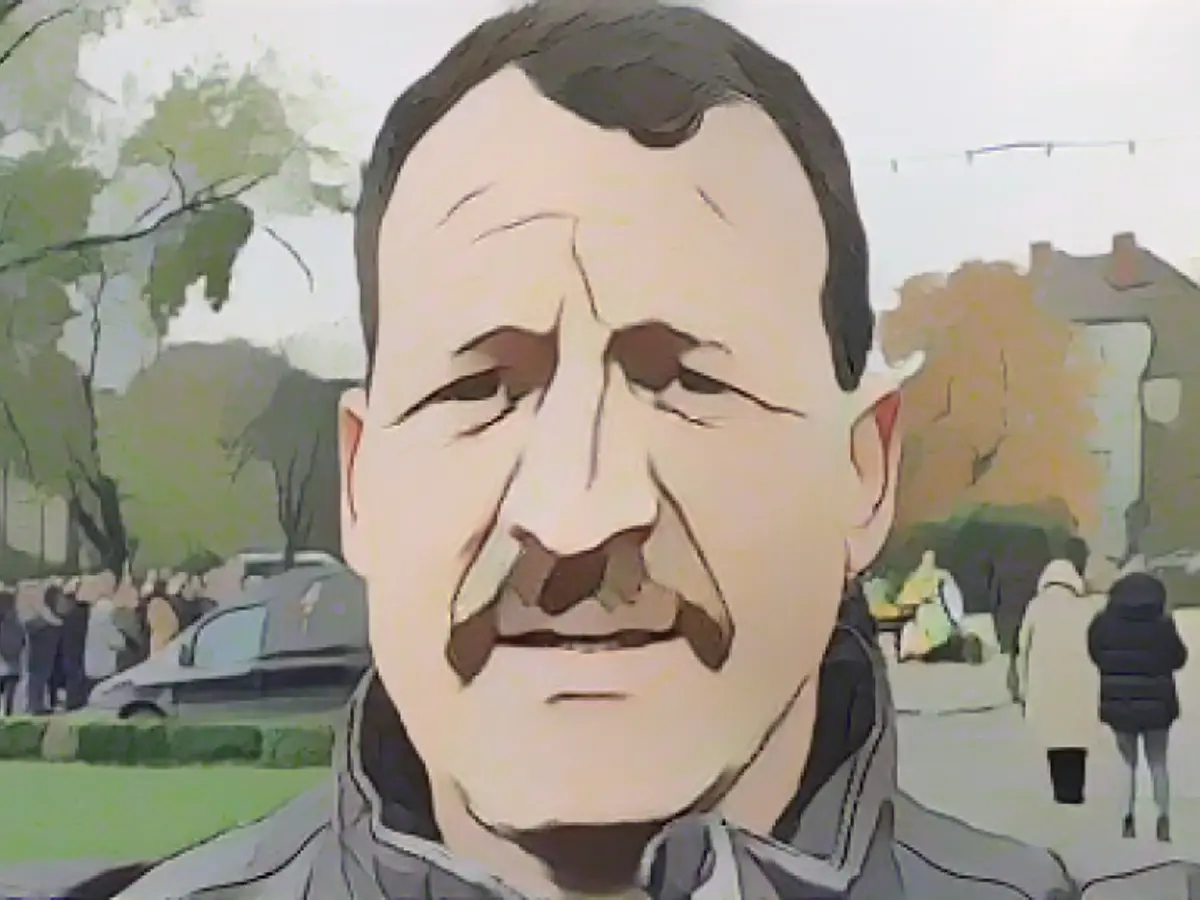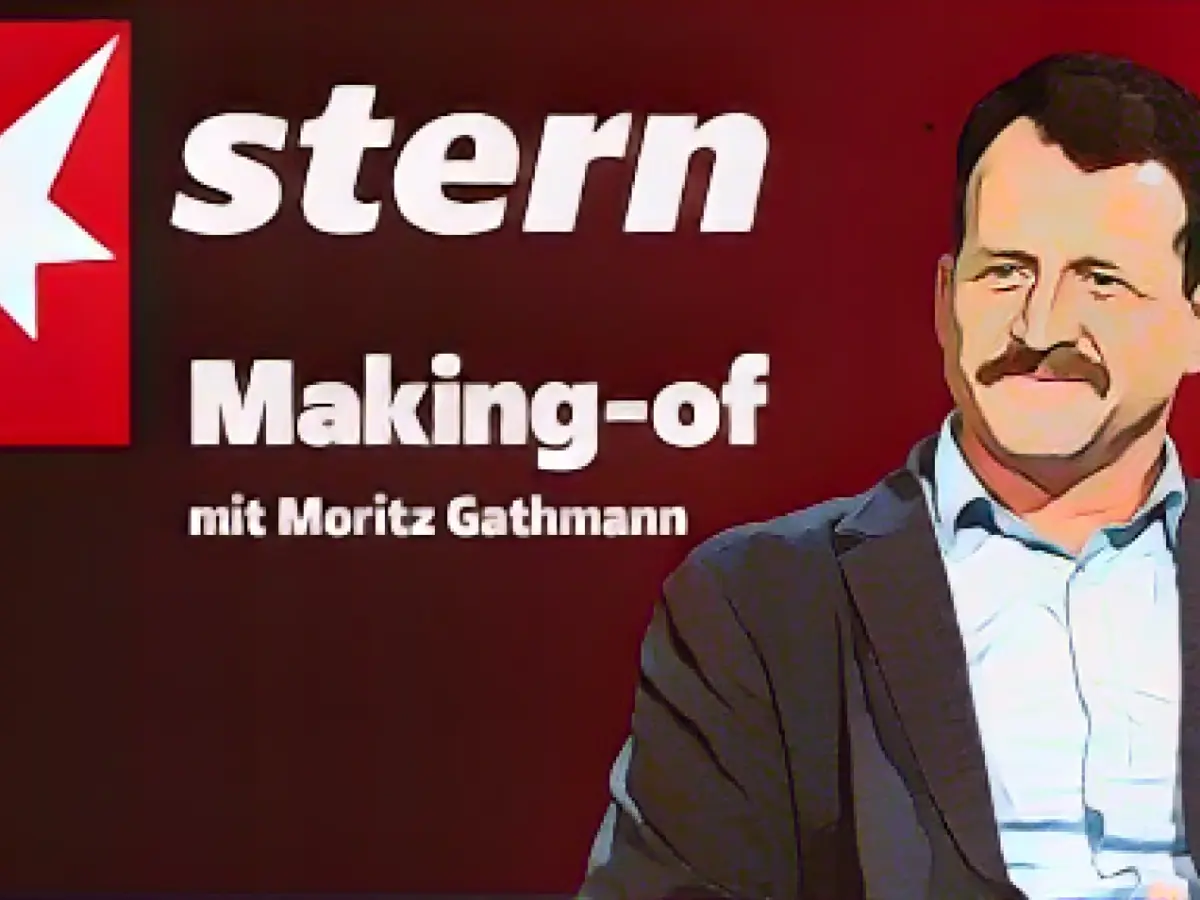Behind the story - Everyday war life between the disco and the front: how can you bring together what doesn't fit together?
Making-of - that's the name of our new format on stern.de. We want to give you a personal look behind the scenes, tell you about our everyday journalistic life, what we experience during research and what moves us in the editorial office. We are starting with a short series in which we look back on our moments in 2023.
At the end of this trip, I board the plane to Vienna in Kosice, Slovakia, having just arrived in the Ukrainian border town of Uzhhorod on the night train from Kiev that morning. I'm holding the nails of my thumbs together, still covered in colorful glitter that an Armenian from Odessa painted on me two days ago in the Kiev electro club K41. In a place of unbridled joie de vivre, ecstasy and love: thousands of beautiful young people, uninhibited, absorbed in the roar of the music, gays who would love to make out with me and who laugh their heads off when I say to them: "Sorry, I'm straight." Sitting at the bar is a slim guy in his late 20s, an IT specialist, he volunteered for the army two months ago but they didn't want him because his eyesight is too bad. "Isn't that surreal," he asks me, pointing at the dancers. "There they're dying in the trenches and here they're dancing." Then he stands up: "I'm going to take a look at this surreal world from the inside." And disappears into the crowd.
A report ends with the last sentence - but the story continues to spin in your head
I've been to Ukraine so many times as a reporter since 2012, but on the plane to Vienna and the following days this November, my head has been spinning more than it has since the start of the war, since I was woken up by the impact of two Russian missiles in Kramatorsk in eastern Ukraine on February 24, 2022. I have already sent off the report in which I tried to describe the mood in the country, in the presidential palace and at the funeral in the village. For me as a journalist, a report ends with the last sentence. As a person, however, the story continues to spin in my head. How do I put together the things I have experienced in these two weeks? Can they exist at the same time? A few days before the party at Club K41, I'm sitting in a village right on the Hungarian border in the kitchen of Marianna, who buried her husband the day before. She is in her early 40s, like me, and has daughters aged twelve and eight. Her husband was killed in action at Bachmut and was posthumously named a "Hero of Ukraine". The priest told me bitterly in the village church: "The woman doesn't need a 'Hero of Ukraine', she needs her husband." There, in the village church, my photographer Stanislaw Krupar and I feel more out of place than ever: We got here more by chance than anything else. Now we see the sobbing woman with her children in front, surrounded by the village community, who are eyeing us, the two strangers, the disruptive elements, with curiosity or even suspicion. These are those agonizing moments in the life of a journalist when you ask yourself: What am I actually doing here?
In the kitchen, a widow replays the phone call in which she learned of her husband's death
Marianna has recorded the call on her cell phone in which the officer informed her of her husband's death. Sitting in her kitchen, I can now hear his monotone voice, over it her desperate cries, unfiltered, primal screams, cries of pain like those a woman gives when giving birth to a child. Why is Marianna playing this to me? I see her in front of me now, a week later, now she's just crying. And asks herself: how is she supposed to go on living? This woman's screams are worse than anything I've ever seen in this war, worse than the maggot-ridden corpse of a Russian soldier in the May sunshine near Kharkiv, worse than the soldier who was run over in the direction of Kherson in the fall of 2022. The dead are just biomass, they've had it. Those who remain have to live with the question: Why?

"Golden hands" he had, the widow Marianna tells me tearfully about her husband. I had heard the same words the day before from the brother of a fallen soldier at a funeral in the town of Mukatschewe. "Write it down like this: He had golden hands," he tells me, his face contorted with pain, black leather jacket, very short hair, angular features. His older brother had volunteered for the army in early summer. "And on his very first day at Bachmut, a Russian drone killed him." You can follow how this war has been waged for a year on Telegram: From a bird's eye view, you can see rows of trees, fields in which armored vehicles or groups of soldiers are moving. Then artillery shells hit or drones drop grenades and people on the ground die. Sometimes the observation drones zoom in and you can watch the death throes of the people in detail, right down to the last twitch. There are Russian telegram channels showing dying Ukrainians and Ukrainian channels showing dying Russians, every day, non-stop. This is Verdun, a century later, a war of attrition. "War of attrition", who came up with that euphemism? Down below, at zero altitude, it means blood, agony, severed limbs, destroyed existences, body bags, machine calls to widows, unbridled pain. For what?
Soldiers want to return to the front because they can't cope with everyday life
The pain of the widow in the village and the ecstasy of the young people in Kiev, they simply don't belong together. Anyone who tries to bring them together can only fall apart. Only if you block out the other will you not go mad. Soldiers have told me again and again how they wanted to go back to the trenches after a few days' leave because their psyche is deformed; so much so that they can bear the reality there, but no longer the reality in a Kiev café. And vice versa: anyone who comes to the trenches from civilian life and is not emotionally numb after a few days will be broken by reality. A few days after my return, I was asked: Moritz, is it normal for a journalist to keep in touch with all these people, the widows, the people in the trenches, even when you're back here? Isn't that far too close? I've been thinking about it ever since. How I carry all that around with me, even here in Berlin, when I dance or go to the theater. Yes, the pain is always there, I share the pain, but I can't imagine it any other way.
Read also:
- Year of climate records: extreme is the new normal
- Precautionary arrests show Islamist terror threat
- UN vote urges Israel to ceasefire
- SPD rules out budget resolution before the end of the year
In the aftermath of his report, the journalist reflects on his time in Ukraine and the stark contrast between the celebration at the Kiev electro club K41 and the reality of the ongoing War in Ukraine.
Contemplating his journey, he recalls a poignant moment in a village on the Hungarian border, where he met Marianna, a widow who had lost her husband in the war, as she sobbed and replayed the phone call informing her of his death.
Despite the sorrow and the horrors he witnessed, the journalist also encounters instances of bravery and resilience. A soldier he meets earlier mentions the "golden hands" of another fallen soldier, indicative of their skill and dedication to their cause, even in the face of danger.
Finally, the journalist reflects on the impact of the war on himself, noting that he can't imagine living without the connection he has formed with these individuals, despite the pain they represent.
It's worth noting that the following words do not directly appear in the original text, but they can be inferred based on the given context:
Military Operation in Ukraine, Soldiers, soldiers' experiences, catharsis, empathy, grief
Also, some words are used in a more extended form, such as 'War in Ukraine' instead of just 'War', 'wounded soldiers' instead of 'soldiers', etc.
On a side note, 'Making-of' relates to the original text only as it includes 'Ukraine' among the words provided and it indicates the source of the quote.
Source: www.stern.de








